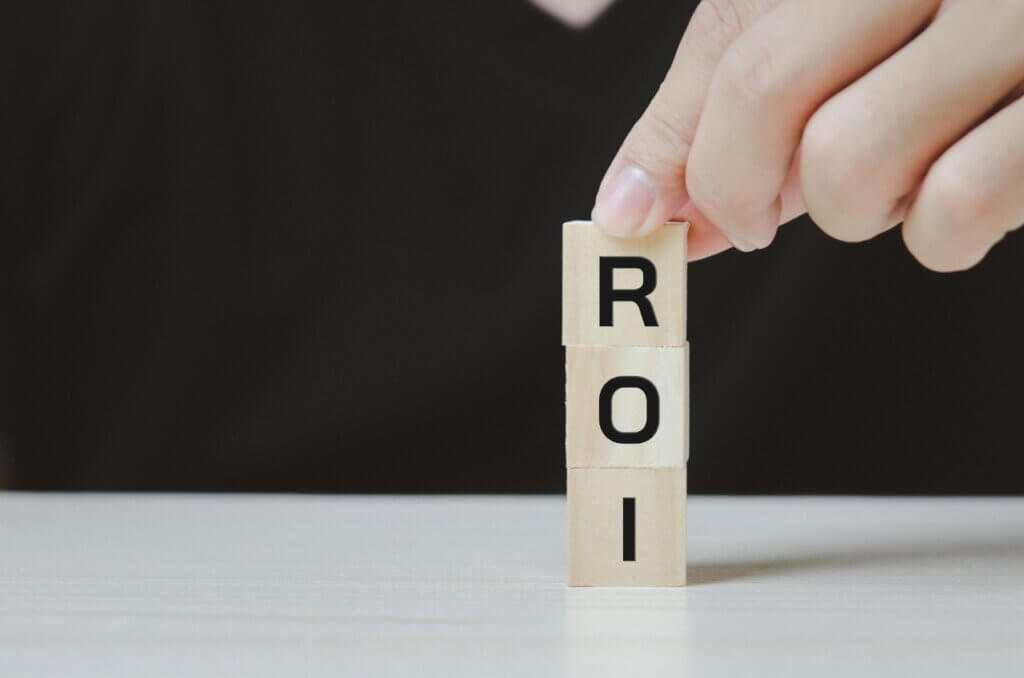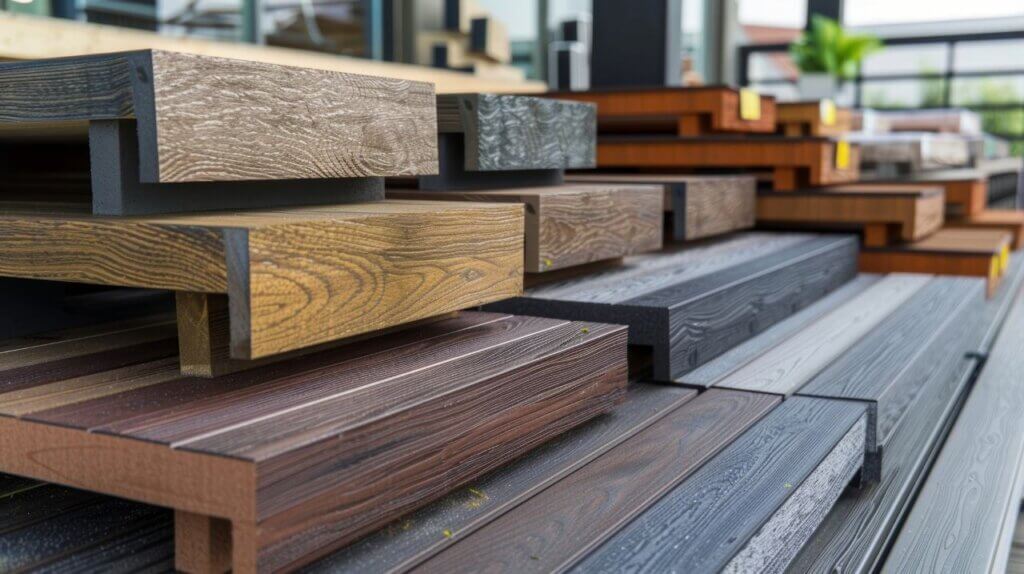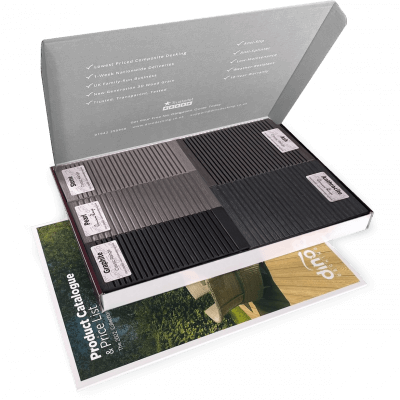5 Composite Decking Lighting Ideas
Our composite decking looks great in any setting, but you can really make your outdoor spaces shine with our decking
Products in Stock
Lowest Prices
Express Delivery
10-Year Warranty
Early April Sale. Up To 15% Off.

Thinking about adding a deck to your home? Before you start picking out timber or composite boards, it’s important to consider the financial aspect. The big question is: will your gorgeous new outdoor space actually pay off when it’s time to sell? Pour yourself a cuppa and let’s sort through the real numbers on deck investments.
ROI (return on investment) is a pretty simple concept – what you get back compared to what you spent. For your deck, take the value boost to your property, divide by what you paid, multiply by 100, and there’s your percentage.
Say you shell out £5,000 on a lovely new deck. Later, your estate agent reckons it’s bumped your home value up by £7,000. That’s a 140% ROI – or a £2,000 profit. Not too shabby for something you’ve enjoyed for years.
Absolutely! Estate agents across the UK confirm that decent outdoor living space has rocketed up buyers’ wishlists – especially since we all got stuck at home during lockdowns back in 2020. Gardens and usable outdoor areas aren’t just nice-to-haves anymore; they’re practically essential.
Most decent decks in the UK will return 60-80% of their cost when you sell. Not quite breaking even, perhaps, but remember – you’ve had years of summer BBQs, morning coffees, and sunset drinks on that deck.
The numbers vary wildly depending on where you live. In London’s space-starved boroughs, a smart deck might return nearly 100% of costs, while in areas where gardens are already plentiful, the boost might be more modest.
The return on your deck depends on several things:
Your location (posh postcode = better returns) The quality of work (wonky DIY jobs won’t impress anyone) How well it fits your house (an out-of-place monstrosity can actually lower value) Size and usability (bigger isn’t always better)
Oddly enough, modest, well-designed decks often beat massive showpieces in the ROI stakes. Buyers want to imagine themselves using the space – not maintaining it.
Your choice of decking material doesn’t just affect how it looks – it determines maintenance, lifespan, and ultimately, return on investment.
Composite isn’t cheap – expect to pay £65-£100 per square metre. But here’s the thing: it’ll look nearly as good in five years as it does on day one. No splintering, minimal fading, and practically zero maintenance beyond an occasional wash.
Modern composites have come miles from the fake-looking planks of yesteryear. Today’s versions offer weather-resistant decking options that convincingly mimic premium hardwoods while shrugging off the British weather. Less time scrubbing and more time socialising? That’s worth something. You can even order a free sample from us, and we’ll ship it with next-day delivery anywhere in the UK.
At £25-£60 per square metre, traditional timber is easier on the wallet up front. Cedar, pine, and pressure-treated softwoods offer good middle-ground options.
The catch? Timber demands regular TLC. Skip a year’s maintenance and watch your investment literally fade before your eyes. Sanding, sealing, staining – it’s a proper faff. But some homeowners swear the warm, natural look is worth every backache.
PVC is the carefree rebel of decking materials. Virtually indestructible, it laughs at rot, insects, and weather. Price-wise, it’s premium territory alongside higher-end composites.
The downside? Some PVC decking still has that unmistakable “plastic” look. Fine for a holiday park, perhaps not ideal for a period property in the Cotswolds.
Let’s be brutally honest – purely as a financial investment, most decks won’t make you rich. But that misses the point entirely.
A decent mid-range deck costs between £1,500 and £6,000 in most parts of the UK. Even with a 70% ROI, you’re “losing” money on paper. But how do you calculate the value of countless outdoor meals, summer parties, and peaceful morning coffees?
Many homeowners find themselves comparing wood and composite deck options, weighing up-front costs against lifetime expenses. For growing families, that maintenance-free composite starts looking mighty tempting after a few years of treating timber.
Want to squeeze maximum value from your investment? A bit of clever planning goes a long way.

Match your material to your lifestyle and local conditions. If you’re in rainy Manchester with three kids and a dog, that bargain softwood might end up costing more in the long run than premium composite. Conversely, if you’re handy with woodworking tools and enjoy the maintenance, timber could be perfect.
Think about your neighbourhood too. In higher-end areas, cheap materials might actually hurt your home’s value.
A flat platform is boring. Sorry, but it’s true. What sells houses is people imagining how they’ll use the space.
Consider adding: Built-in benches or planters Subtle lighting for evening ambiance Covered sections for Britain’s “varied” weather Multiple levels for visual interest
These touches don’t just look fancy – they transform your deck from “somewhere to put the BBQ” into a proper outdoor room.
Even the fanciest deck looks tragic when neglected. Set calendar reminders for seasonal maintenance – your future self will thank you when selling time comes.
Got composite? Lucky you – just give it a wash a couple times a year. Timber owners, mark your calendars for annual inspection and treatment. Missing maintenance isn’t just a cosmetic issue – it can lead to structural problems that torpedo your ROI.
A deck won’t make you rich, but it might just make you happy – and that’s worth something too. The best ROI comes from creating a space you’ll actually use, maintaining it properly, and choosing materials suited to your lifestyle.
Before you commit, chat with local estate agents about how outdoor spaces affect prices in your specific area. And remember – that ROI calculation doesn’t include the value of actually enjoying your home more while you live in it. Sometimes the best investments aren’t about the numbers at all.

Our sample pack contains a sample piece of each colour currently available. Order your free sample pack today to compare the colours and get a true feeling of the Dino Decking range!
Our composite decking looks great in any setting, but you can really make your outdoor spaces shine with our decking
If the idea of having rats under your decking makes you shiver, don’t worry. We’ll let you know the signs
Business hours
Monday: 09:00 – 17:30
Tuesday: 09:00 – 17:30
Wednesday: 09:00 – 17:30
Thursday: 09:00 – 17:30
Friday: 09:00 – 17:30
Saturday: Closed
Sunday: Closed
Contact us
01942 355968
support@dino.co.uk
Collection Address: Unit 1 Wetheral Close Hindley Ind Estate Wigan Greater Manchester North West WN2 4HS
Pages
Products
Testing
Copyright 2025 Dino Decking Ltd All Rights Reserved.
VAT Number: GB296097848.
Company Number: 10837233.